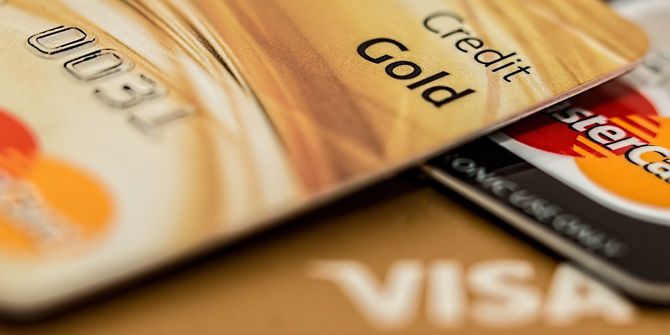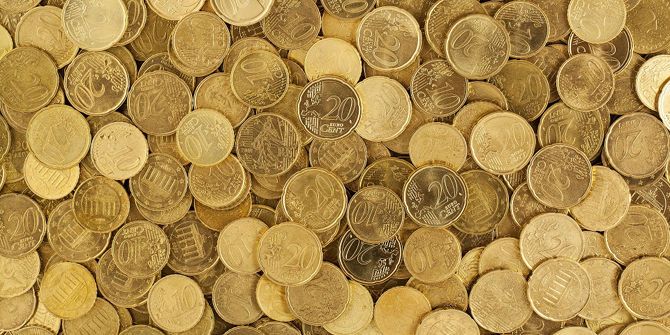What is a beach if not a massive collection of tiny grains of sand? Each individual grain is insignificant, but when you put them all together in one place, it's a lot easier to see the big picture.
The same holds true for money.
We all deal with a lot of fees and costs over the course of our lives. These may seem fine in the moment because they're relatively small. But if you add them all together, you'd be surprised by how much money you're actually throwing away.
In this post, we'll explore 15 lesser-known money leaks that you should plug. Some tips involve cutting expenses out of your life, and other tips involve grabbing money on the table that you didn't realize was there. I guarantee you'll find at least one useful tip below!
1. Interest Rates
The average interest rate for a credit card is 18–24%. Let's say you have $10,000 in credit card debt and you only make minimum payments. At 18%, you'll pay $2,840 ($1,704 of that in interest) in the first year, but at 24% you'll pay $3,408 ($2,272 of that in interest).
A huge difference -- and that's just in the first year!
My point is, every percentage point matters when it comes to interest. And you can probably get your interest rate reduced just by asking your credit card provider. It won't always work, but it works more often than not. One phone call could save you thousands.
2. Late Payment Fees
When you're drowning in debt, you may eventually run into a month when you can't make all of your minimum payments on time. And neglecting a credit card payment can result in a significant late fee.
If you have a history of good standing with your provider, you may be able to ask them to waive such fees. This won't work if you've constantly missed payments, and it has the greatest chance of working the first time you miss one.
3. Annual Credit Card Fees
Avoid using credit cards with monthly or annual membership fees. The only exception to this is if the card comes with a rewards program that's so good that you can easily make up the difference, whether in cash back, airline miles, or other rewards.
A $99 annual fee is money that's thrown away for no good reason. Even a $5 monthly fee adds up to $60 lost every year, again for no good reason. You can always shop around for an equal or better card without such a fee (even if your credit score is abysmal).
4. Savings Accounts
Interest rates for savings accounts have been terrible over the past decade. My local bank offers no better than 0.01%. That means stashing away $10,000 will earn me $1 after one whole year. At that point, having an interest rate is almost insulting.
Which is why I store my savings elsewhere using one of these online banks. Because they don't have as much overhead as brick-and-mortar banks, they can pass the savings on to you with higher interest rates. That same $10,000 can now earn me at least $100 every year.
5. Investment Expense Ratios
Saving for retirement is absolutely essential, but how you save for retirement is just as, if not more, important. Investing in the wrong vehicles can end up eating into your overall gains, and when you compound that over 30–40 years, you could lose out on thousands and thousands of dollars.
When you invest in a mutual fund, such as a target date retirement fund, you have something called an expense ratio. This is a fee you pay to the fund manager to cover operating costs. And as you might expect, different funds have different expense ratios.
The average expense ratio is around 1%, but you can find much better deals if you know where to look. Vanguard's Target Date Fund, for example, only has an expense ratio of 0.18%, making it one of the best values around.
6. No-Contract Mobile Plans
Mobile plans exist as one of the biggest modern money leaks. Dropping $150 or more every month just for smartphone access is excessive when you're struggling to make ends meet. That's why we recommend switching to a no-contract mobile plan.
I'm on such a plan and only paying $25 per month for two phones. You'll have to adjust your habits, such as using Wi-Fi instead of data whenever you can, but it's not as painful a transition as you'd think. Saving over $100 per month certainly makes up for it.
7. Impulse Shopping
Impulse shopping itself isn't really a "hidden" waste of money, but you'd be surprised how many tricks and tactics marketers will use to spur you into action. You don't wake up intending to buy something on most days -- you get tricked into it. Be aware of the tricks and impulse shopping will go down.
This is also a great way to stop buying gadgets that you'll regret later. Buyer's remorse is real, and impulse shopping plays a big role in it. Don't want to give up shopping altogether? Check out these tips for enjoying tech without spending so much money.
8. Shipping Fees
These days, I do almost all of my shopping online (groceries and Costco are the only exceptions.) Shipping fees were a big pain when I first made the switch, especially when it came to clothing and returns. An extra $5–10 on every order adds up.
This is why Amazon Prime is such an amazing deal. Not only do you get free two-day shipping, which alone can make up for the subscription cost, but you also get all kinds of other benefits like Prime Pantry, Prime Video, Prime Music, Prime Reading, and more.
If you don't want to use Amazon or Prime, here are several other nifty ways to score free shipping online.
9. Amazon Coupons
Did you know that Amazon has an entire section dedicated to coupons? As I write, I see coupons that let me save 40% off candy, 50% off baby wipes, $5 off whitening strips, $3 off dog treats, and that's just on the front page.
Some of these coupons are available to everyone while some are only available to Prime members. This is one of the features that can make Prime Pantry worth using -- clipping even just a few coupons can save a lot on an order. If you've never used Amazon coupons before, you're leaving money on the table!
10. Insurance and Warranties
Before shelling out cash for insurance on an electronic device or buying an extended warranty policy, you should know that a lot of credit cards offer something similar at no extra charge. This is one of the main reasons why you should always purchase electronics on a credit card.
So before spending $100–350 on a service like AppleCare, think about whether it's worth it. Your credit card might provide a year (or more) of extended coverage on top of the manufacturer warranty.
11. Digital Luxuries
Splurging is fine from time to time, but you have to make sure the thing you're splurging on is worth it. The problem is that they usually aren't. If something is valuable to you then by all means buy it, but if you know you can go without it, then consider that.
For example, in-flight Wi-Fi is rarely worth it: you end up paying a massive premium for a pittance. It might seem worth it if you're addicted to your smartphone, for example, but why not buy an e-reader like a Kindle and read during your flight instead? It will come in handy for many flights and save you a bunch on Wi-Fi costs.
12. Digital Subscriptions
How many digital subscriptions do you have that you've forgotten about? I'm talking about newspapers, magazines, Netflix, Hulu, YouTube Red, Blue Apron, all kinds of subscription crates, and even things like Patreon. Go back and get rid of the ones you never use -- this is one of the easiest ways to slash your monthly expenses.
Be especially wary of free trial offers! If you forget to cancel in time and you don't keep a close eye on your credit card statement, you could be losing money for no reason at all.
Don't forget about subscriptions to Creative Cloud. If you haven't used Photoshop or Lightroom in a while, maybe it's time to drop your plan until you get back into it. Or maybe just use one of these free alternatives.
13. Family Plans
Spotify, Google Play Music, Apple Music, Amazon Prime, Office 365, CrashPlan -- what do all of these have in common? They're all subscription-based, but they also provide family plan options.
If you use any of them, you can cut down your monthly costs anywhere from 20–80 percent by taking advantage of this. You get to keep your own account separate. No downsides at all. There isn't much more to say than that.
14. Gas Money
Tired of spending hundreds on gas every month? You've heard all of the obvious solutions: carpool, stop going out so often, switch to a car with better gas efficiency, find another job with a shorter commute, even consider walking or biking to work.
But if you're really trapped and/or don't want to implement any radical changes, you could still save money by using one of these gas-saving apps. They'll teach you how to drive gas-efficiently, show you which nearby gas station is cheapest, and help you save in other ways, too.
15. Flight Tickets
Want to get airline tickets as cheaply as you can? There are several tricks and techniques you can use to save hundreds of dollars every time. And one of the easiest tricks? Shop in private browsing mode (AKA "incognito mode").
All of These Leaks Can Really Add Up
If you implement even half of the tips in this post, you'll end up saving a lot of money every month. $10 here and $10 there may not seem like much, but $10 from eight different sources monthly turns out to be almost $1,000 every year.
What would you do with $1,000?
If you want to save even more money, or better yet, if you want to become master over your money instead of being a slave to your habits, we encourage you to look up the simple side of personal finance. You'll be amazed! I guarantee it.
What kinds of tips and tricks have you used to cut down on your expenditures? What other "hidden money leaks" are out there for people like you and me? Share with us below!
Image Credit: Jag_cz/Shutterstock






